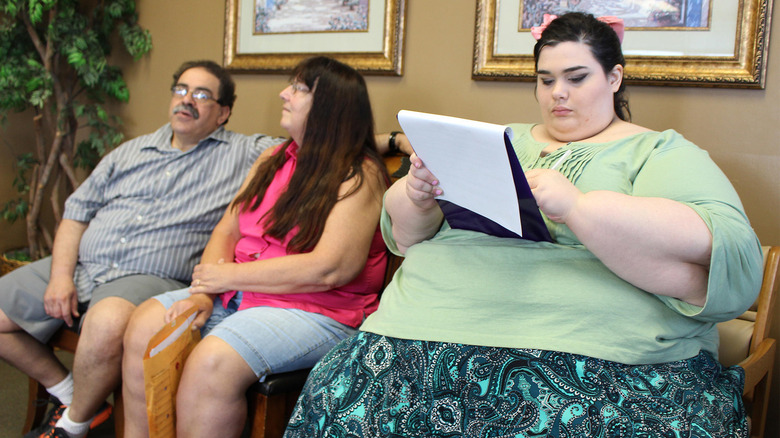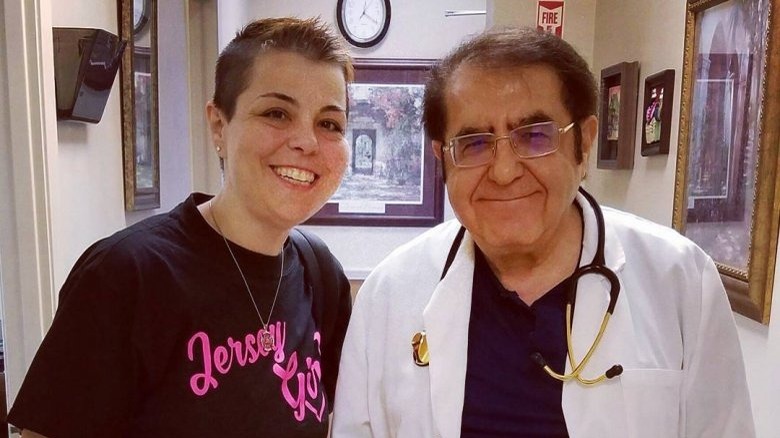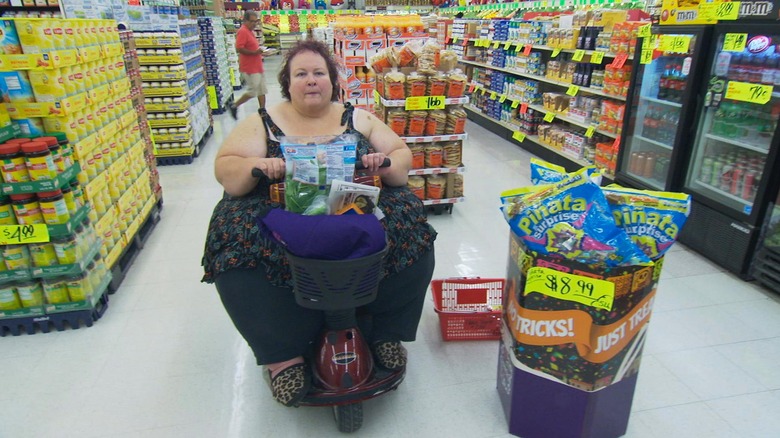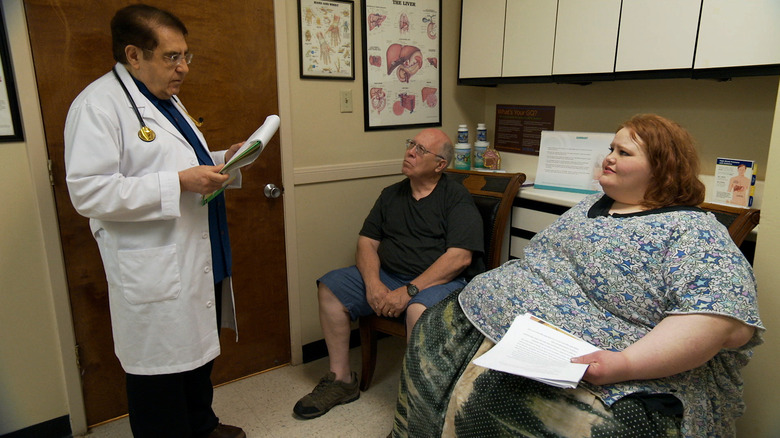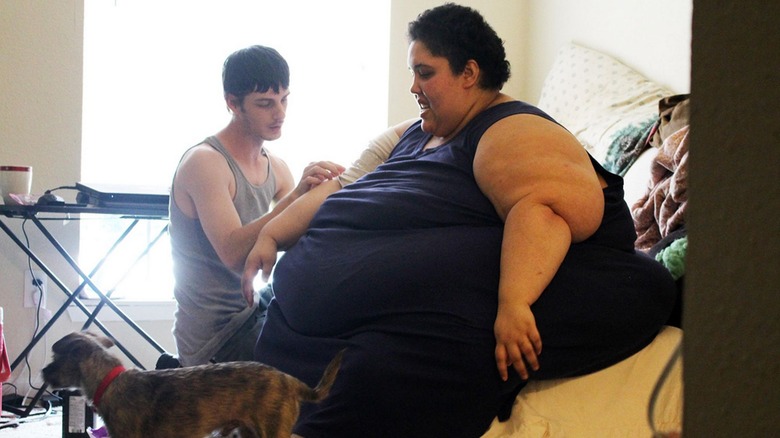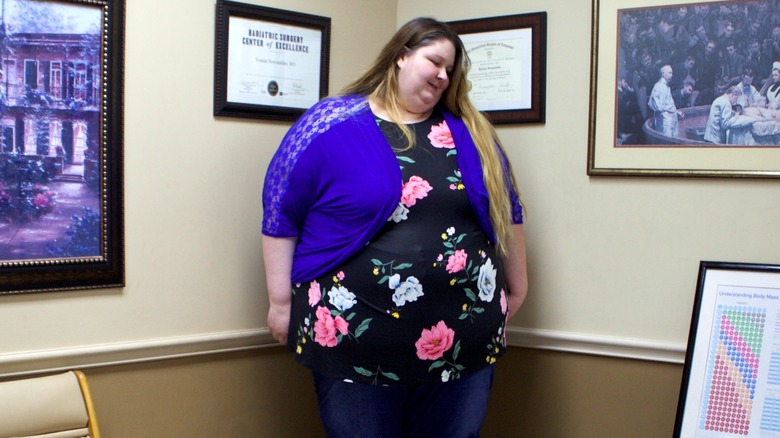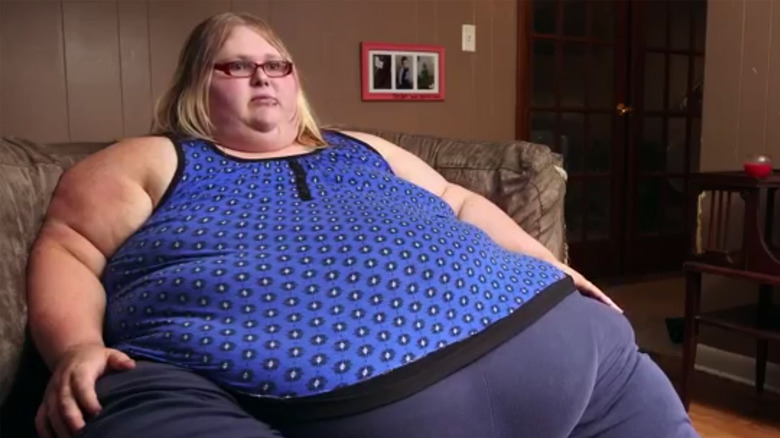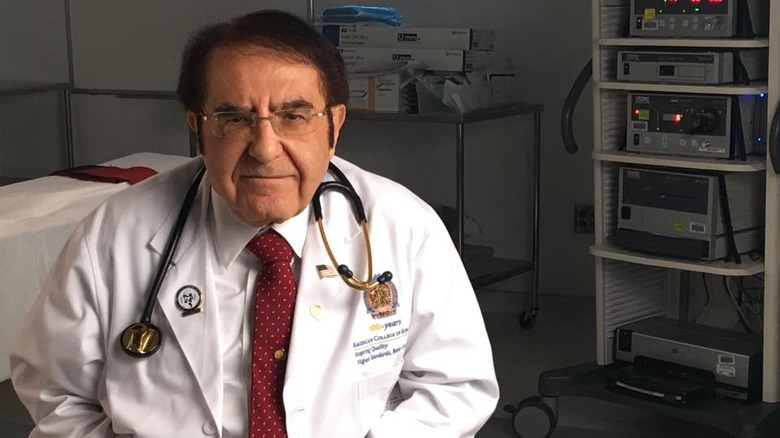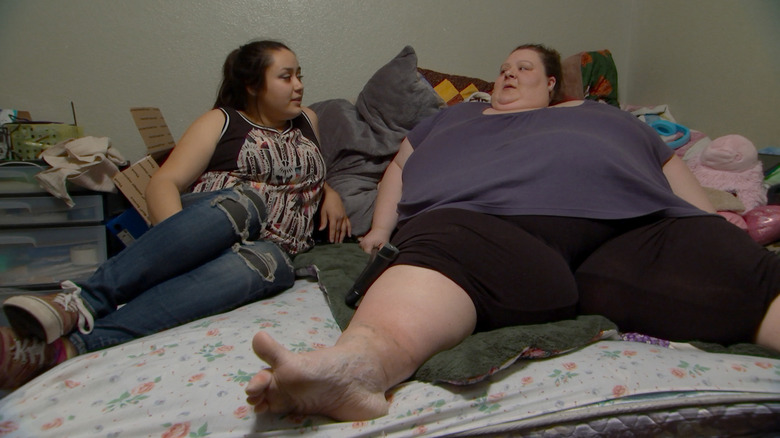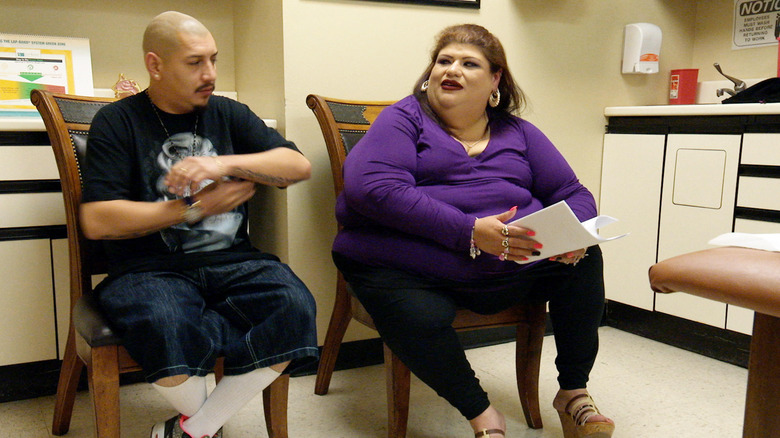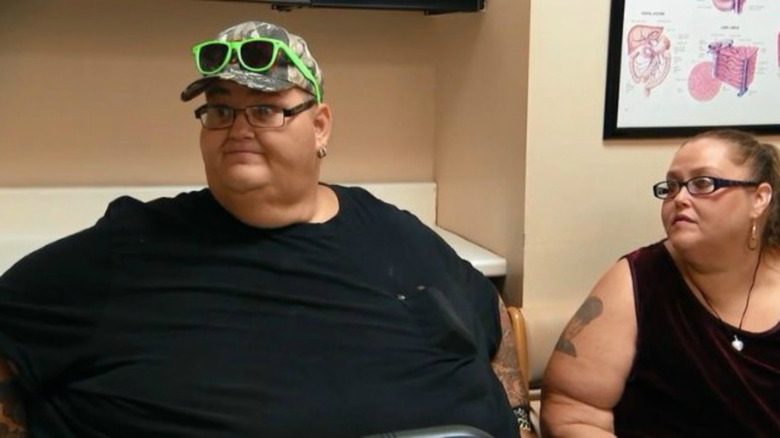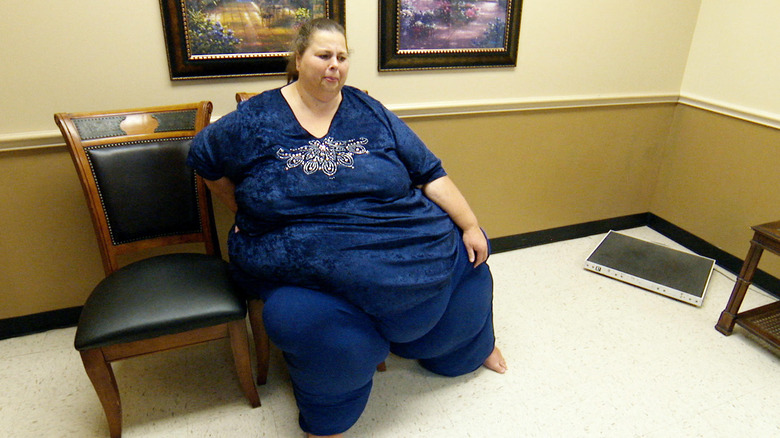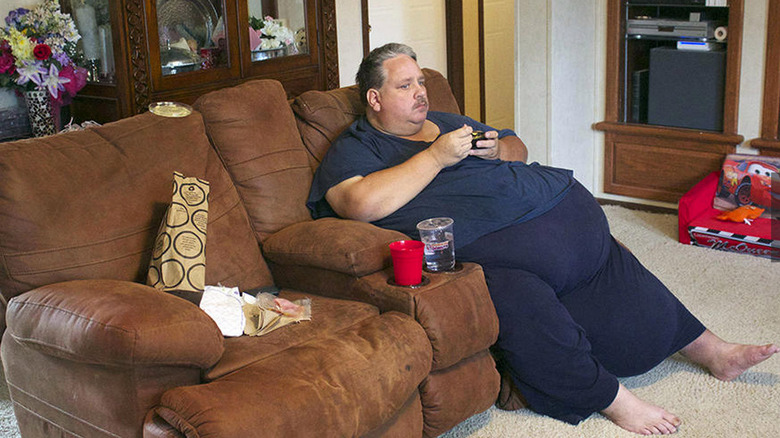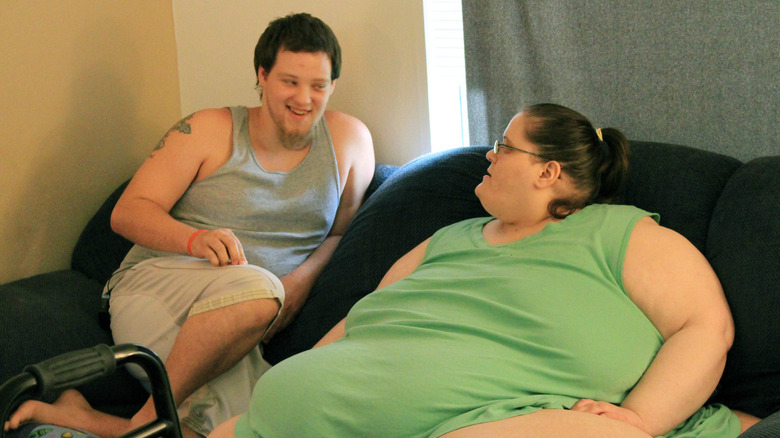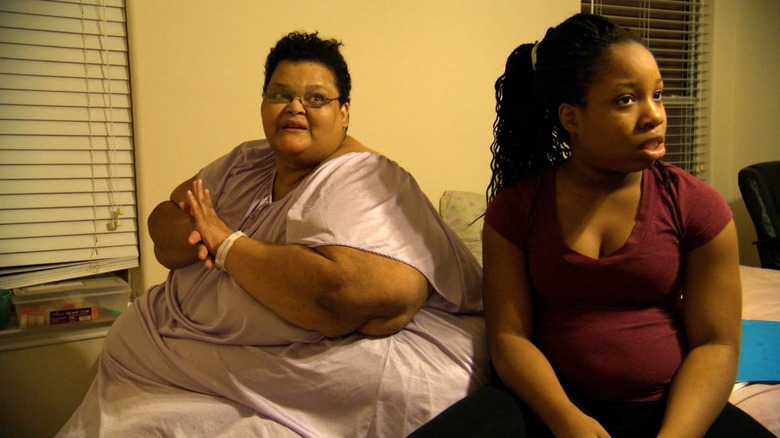My 600-Lb Life: False Things You Can Stop Believing
Regular viewers of My 600-lb Life on TLC know pretty much what to expect when they tune in for an episode. The hour-long show chronicles the weight loss journeys of patients who, at their heaviest, weigh 600 pounds or more. It's an intimate affair, wherein patients get candid on every level, from their childhood trauma to their eating habits and struggles with food addiction. The program also invariably shows patients in varying stages of undress, giving viewers access to almost every part of the patients' lives.
Once you get to know the people on the show, however, you might find yourself wondering what's at play behind the scenes. For one, how is it that so many people can wind up weighing so much? Can't they just stop eating? Does Dr. Now really care about his patients or does he have ulterior motives? And what's the deal with the people who keep bringing patients food? Here are the false facts you can stop believing about My 600-lb Life that will set the record straight.
Dr. Now is just in it for the money
Dr. Younan Nowzaradan, or Dr. Now, as his patients call him, is quite the character on My 600-lb Life. He's incredibly straightforward, usually to the point of bluntness, and doesn't feed his patients pretty stories promising that they won't have to work hard. Sometimes he even seems overly clinical, so you might wonder if he's just in it for the money, or just loves being on television.
In truth, however, Dr. Now often doesn't make any money for the weight-loss surgeries he performs. Instead, his commitment to medicine is what guides him. "Looking at the moral obligation that we've got, you see somebody who has no life who could have a life," he shared in an interview with Houstonia magazine. "We don't need to be rich. We do make a living, but we don't need to worry about making a living out of every patient we see." So his motivation truly is to help people have healthy and productive lives, instead of eating their lives away.
The patients are paid big bucks to be on the show
Even though the patients on My 600-lb Life receive resources to turn their life around and the surgery to help get them to a healthier and happier place, it can't be easy to film the show. For one, there's always a camera around, so people are always watching. And often, it's difficult for patients to make the trek just to see the doctor. Often times they have to uproot their entire lives and relocate to Houston, which has to be a ton of work!
To that end, you might wonder if the participants are also getting a massive kickback to be on the show. But in reality, the patients get at most $1,500 as a "talent fee" plus a $2,500 relocation stipend if needed, according to Starcasm. That's not a lot! And some patients struggle with money long after their episode airs, like Nicole did with car issues according to her since-deleted Facebook page. Plus Amber has talked about not having enough money to finance skin removal surgery on her Facebook page, so patients aren't exactly rolling in the dough.
The patients are lying about their pain
There are a few things that all of the patients have in common on My 600-lb Life, and experiencing pain is definitely one of them. Whether it's pain while walking, pain while driving, or pain trying to accomplish even the most basic tasks, patients on the show have talked at length about how much they're hurting, both physically and mentally.
While you might be tempted to think that the patients have to be faking it, or are making things sound worse than they actually are, chances are they're not exaggerating about how painful things have gotten for them. According to a study in the Journal of Pain Research, there's strong evidence that comorbid obesity is not uncommon among people with chronic pain conditions. Additionally, obese individuals commonly report having pain as well, so there is a clear correlation between the two conditions. So it's highly doubtful that anyone is making their pain sound worse than it already is.
The enablers can just easily stop bringing food to the patients
As Dr. Now often says, most (if not all) of the people on the show have enablers, usually family members, who are complicit in a patient's compulsive overeating. Often, enablers don't just tolerate the overeating, but also will bring patients the very food that's essentially killing them. So once Dr. Now puts his patients on a diet, the enablers should simply be able to stop bringing them food, right?
Wrong. The psychology of addiction and enabling is actually quite complicated, according to an article in Psychology Today penned by Carole Bennett, MA. In it, she lists the variety of different reasons people enable their loved one, including fear of hurting their feelings, fear of retaliation from the addict, a desire to be liked or loved, and just being so used to it that they're afraid to change. So to suddenly stop engaging in enabling behavior can be quite daunting, which is why enablers can't simply stop bringing the patient burgers, and instead bring them salad and other healthy foods.
The patients could stop eating without help if they really wanted to
Fat phobia is, according to an article in Psychology Today, quite rampant in society, and it makes the lives of obese individuals quite difficult in a variety of ways. That includes the widespread belief that obese people are lazy and lack willpower, and are solely responsible for their body size. So it makes sense that many people believe that the patients on My 600-lb Life could just stop eating if they really wanted to.
But longtime viewers of the show all know how hard it can be for patients to make the changes they need to make to lose weight. For one, many people with a binge eating disorder have tried for years to control it without success, according to the Cleveland Clinic, so it's not easy to reign in. That's why Dr. Now will often send patients to receive psychological counseling to help them deal with the issues that compel them to eat. Once they face their demons, they often find that they can better control their dietary intake.
Fans love the shower scenes
One of the things My 600-lb Life is infamous for are the graphic bathroom scenes. In every episode, viewers see the patients waking up in the morning and attending to their hygienic needs. While most of the time this consists of patients using the restroom and taking a shower (with no clothing and minimal censorship), sometimes it varies if the patient can't fit in the shower, or if they're immobile and bed-ridden. In that case, they'll use a bed pan and have a sponge bath, or even be bathed outside with a garden hose. It can get pretty humiliating.
The show's producers must believe that this is an essential part of the show, and something that all viewers enjoy. But plenty of fans think the scenes are unnecessary, and have voiced those feelings on social media. "The obligatory shower scenes sometimes bother me," one fan wrote on Reddit. "It feels freak-showish and there is no attempt to maintain the person's dignity." Maybe they'll stop showing these scenes in the future, but it appears that some viewers do admit to enjoying them, as evidenced by other comments in that same Reddit thread.
Dr. Now isn't that good of a doctor
Dr. Now has definitely become quite the famous reality television star thanks to the popularity of My 600-lb Life. But some viewers might think that he basically just plays a doctor on television, and isn't really that great at what he does. He certainly has an eclectic bedside manner!
But Dr. Now is actually a real pioneer in his field, with a long and successful career in medicine. For one, most doctors and hospitals will not accept patients over 450 pounds for weight loss surgery because they don't have the right equipment, but Dr. Now accepts many, many patients who far exceed that weight. Additionally, he was the first doctor in all of Houston to use laparoscopic techniques for procedures they hadn't been used for previously. He has also published about his work in prestigious medical journals, showing that he really does know what he's talking about.
Weight loss surgery is a quick fix
Everyone knows that losing weight can be extremely difficult. That's one reason weight loss surgery is so popular, as it has helped many, many people lose weight and transform their lives. And according to the American Society for Metabolic and Bariatric Surgery, more and more people are getting these procedures done every year.
But weight loss surgery is no quick fix, something Dr. Now is quick to point out. "People come looking for a single solution to their problem, and sometimes the answer is not what they want to hear," he shared in an interview with Houstonia magazine. "They think surgery is the solution for everything. And it's not going to change people's behavior toward food." So as he often says on the show, the surgery is just a tool to help patients gain control over their food addiction. They have to put in the hard work of adopting healthy eating and exercise habits for the rest of their lives. That's not an easy thing to do!
It's hard for patients to find romantic relationships
In general, widespread fat phobia perpetuates a narrative that obese people are repulsive, and that no one wants to be around them, let alone be in a romantic partnership them. To that end, a lot of people might think that the patients on My 600-lb Life are doomed to a celibate life of solitude, and unable to find romantic love.
But regular viewers know that nothing could be farther from the truth. Many, if not the majority of the patients, already have romantic partners when they enroll in Dr. Now's program, like Alicia, Nicole, and Chuck. Often times romantic partnerships can dissolve during the show if one of the partners is uncomfortable with their loved one making changes, like Laura, but even those patients find new love, like Zsalynn. It just goes to show that plenty of obese and even morbidly obese people have no problem getting a date!
Childhood trauma can't make the patients eat that much
Another thing that most, if not all of the patients on My 600-lb Life have in common is the unfortunate experience of childhood trauma. Some patients grew up in a chaotic household with parents addicted to drugs or alcohol, some were molested by an adult figure in their lives, some were subjected to violence, and others survived gang rape. But is it really possible that childhood trauma can cause someone to eat their way to 600 pounds?
The answer is, resoundingly, yes, according to Dr. Judith J. Wurtman, who penned an article in Psychology Today. "No one gains massive amounts of weight just because they love to eat," she wrote. "There is almost always a sad story." And that sad story is often how a painful childhood trauma altered an individual's psychology to the point where their compulsive overeating couldn't be controlled. And My 600-lb Life shows, in extreme cases, just how devastating the impact of these painful events experienced in early life can be.
The patients have to know how big they are
Quite often, when patients first arrive at Dr. Now's office in Houston and step on the scale, they are surprised to see how much they actually weigh. It can be extremely difficult, too, to be confronted by the reality of how much weight they have gained because of their compulsive eating habits. But wouldn't they know that they've tipped the scales over 600 pounds given how many calories they take in every day? Especially since they pretty much eat nonstop?
Many of the patients truly don't realize how bad things have gotten, and it's fathomable. For one, most bathroom scales only go up to 300 pounds, so there's no way for them to get an accurate measurement of their weight. Even scales you find at most doctor's offices aren't built to weigh someone who weighs 600 pounds or more. That's why Dr. Now has a custom scale in his office that can weigh up to 900 pounds. Learning that you weigh that much could be quite a nasty shock, so it makes sense that the patients might have lived in denial for quite some time and opted not to find out how much they actually weigh until they're faced with it on the show.
Everyone has a follow-up episode
My 600-lb Life has gotten so popular that TLC created a spin-off show, My 600-lb Life: Where Are They Now? As you can glean from the title, this show follows up on previous participants on My 600-lb Life, checking in on them and seeing what progress they've made. It's usually quite heartening, as many patients continue to make good progress, and are much happier than they were before surgery.
But if you're hoping that every patient gets a follow-up episode, that's not going to happen, as some of the participants didn't have a positive experience while filming. For example, Amber Rachdi, who starred in Season 3, Episode 1, has real beef with the production company. "They ran late, reshot difficult to replicate scenes, and really sort of acted like bullies," she shared in an interview with Starcasm. "When I would say I had a boundary I didn't want crossed, their first reaction was always to threaten to postpone or cancel my surgery." Ugh, that sounds horrible! No wonder she doesn't want to go back.
Rachdi also stresses that she doesn't regret her surgery, and that Dr. Now is "truly wonderful." Phew!
Being obese isn't genetic at all
A lot of people like to say that a person's weight is simply the result of the calories they take in vs. the calories they burn on a day-to-day basis. Additionally, folks think it's easy to make healthy choices, and simply eat when they're hungry and stop when they're full. To that end, it should be easy for an obese person to lose weight, as everyone starts from the same place, right? And there's nothing genetic at play either to stop them, right?
Wrong. It's actually much more complicated than that, according to an article Dr. Now penned in Obesity Help. "We need to spread the message that obesity is not a patient's choice," he wrote. "That it is a metabolic and genetic disposition that people have, and this is a disease and needs to be treated as a disease." So there's a lot more at play than a person's will-power. That's why it's important to have a holistic perspective of obesity, and to exercise compassion instead of judgment.
The show is just like The Biggest Loser
Another popular weight-loss show on television, which ran from 2004 through 2016, is The Biggest Loser. On the program, contestants who were all obese competed against one another to see who could lose the most weight in a season with diet and exercise. The winner was awarded a cash prize, and of course, the title of The Biggest Loser.
But the show came under scrutiny when it was revealed that the techniques used on the show did not lead to long-term weight loss. According to the Harvard Health Letter, the hormonal changes that the participants underwent conspired to make contestants regain some, if not all of their weight. Additionally, the evidence suggests that the best weight-loss solutions for those who are severely obese is weight loss surgery.
So it's clear that the techniques used on The Biggest Loser are drastically different than on My 600-lb Life. While Dr. Now requires all of his patients to stick to the program, and of course eat a healthy diet and get exercise, he's not shipping them off to boot camp.
